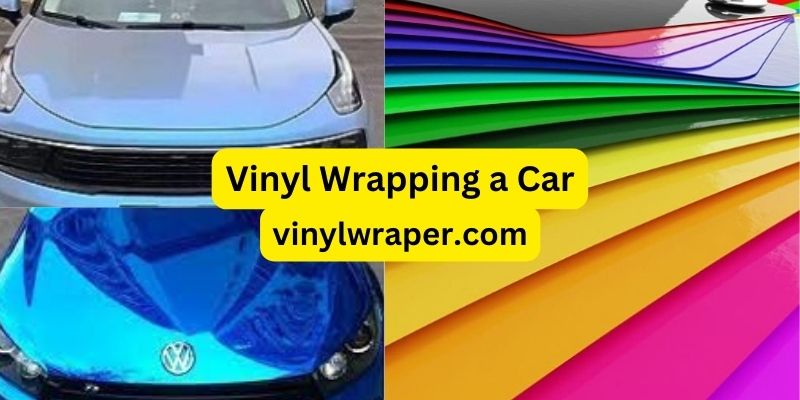Vinyl Wrapping a Car: The Ultimate Guide
Updated: September 29, 2023
177
Introduction
Vinyl wrapping is a process of applying a thin layer of vinyl film to the exterior of a car. The vinyl film can be used to change the color of the car, protect the original paint, or create a unique custom design.
There are many benefits to vinyl wrapping a car. Vinyl wraps are significantly cheaper than repainting a car, and they can be customized in many different ways. Vinyl wraps are also more durable than paint, and they can protect the car’s original paint from scratches, chips, and UV damage.

There are two main types of vinyl wraps: cast vinyl and calendared vinyl. Cast vinyl is more expensive than calendared vinyl, but it is also more durable and easier to apply. Cast vinyl is the best choice for full car wraps and custom designs.
Calendared vinyl is less expensive than cast vinyl, but it is also less durable and more difficult to apply. Calendared vinyl is a good choice for partial car wraps and simple designs.
How to choose the right vinyl wrap for your car?
When choosing a vinyl wrap for your car, there are a few factors to consider:
- Type of vinyl: Cast vinyl is the best choice for full car wraps and custom designs, while calendared vinyl is a good choice for partial car wraps and simple designs.
- Color: Vinyl wraps come in a wide variety of colors, including matte, satin, and gloss finishes. Choose a color that you like and that will complement the style of your car.
- Durability: Vinyl wraps vary in durability. Some wraps are designed to last for several years, while others are only designed to last for a few months. Choose a wrap that is durable enough for your needs.
- Cost: Vinyl wraps vary in price. Cast vinyl is more expensive than calendared vinyl, and custom designs are more expensive than pre-made wraps. Choose a wrap that fits your budget.
How to vinyl wrap a car?
If you are planning to vinyl wrap your car yourself, there are a few things you need to do to prepare. First, you need to clean the car thoroughly. Remove all dirt, wax, and grime. Once the car is clean, you need to sand the paint lightly to create a smooth surface for the vinyl to adhere to.
Once the car is prepared, you can start applying the vinyl wrap. Start by applying the vinyl to the larger panels of the car, such as the hood, roof, and doors. Once the larger panels are covered, you can start applying the vinyl to the smaller panels and trim pieces.

NICAI Factory Car Vinyl Wrap Premium Matt Chrome 45CM*9M Vehicle Car Body Color Change Vinyl Film Sticker Car Wrap
buy now (ali baba)When applying the vinyl, be sure to use a heat gun to soften the vinyl and make it easier to work with. Be careful not to overheat the vinyl, as this can damage it.
Once the vinyl is applied, you need to trim any excess material and use a felt roller to smooth out any wrinkles. You also need to seal the edges of the vinyl with a primer to prevent it from peeling.
Tips for vinyl wrapping a car
Here are a few tips for vinyl wrapping a car:
- Work in a clean, well-ventilated area. This will help to prevent dust and other contaminants from getting on the vinyl.
- Use sharp tools. This will help to make clean cuts and prevent the vinyl from tearing.
- Be patient. Vinyl wrapping can be a time-consuming process, but it is important to take your time to ensure a good result.
Common mistakes to avoid
Here are some common mistakes to avoid when vinyl wrapping a car:
- Not cleaning the car properly. This can prevent the vinyl from adhering to the paint and cause it to peel.
- Not sanding the paint lightly. This can also prevent the vinyl from adhering to the paint and cause it to peel.
- Overheating the vinyl. This can damage the vinyl and make it difficult to work with.
- Not trimming the excess vinyl properly. This can cause the vinyl to wrinkle and peel.
- Not sealing the edges of the vinyl. This can also cause the vinyl to peel.
How to care for your vinyl wrap
To care for your vinyl wrap, you should wash your car regularly with a mild soap and water solution. You should also avoid using harsh chemicals or abrasive cleaners, as these can damage the vinyl.
Valuable insights
Here are some valuable insights about vinyl wrapping a car:
- Vinyl wraps can be used to create a unique custom design for your car.
- Vinyl wraps can protect your car’s original paint from scratches, chips, and UV damage.
- Vinyl wraps are more durable than paint, but they will eventually need to be replaced.
- Vinyl wraps are a cheaper alternative to repainting a car.
Vinyl wrap designs
Vinyl wraps can be used to create a wide variety of designs, including:
- Color change: Vinyl wraps can be used to change the color of your car completely. You can choose from a wide variety of colors, including matte, satin, and gloss finishes.
- Custom designs: Vinyl wraps can also be used to create custom designs for your car. This could include things like racing stripes, tribal art, or even your favorite sports team logo.
- Partial wraps: You don’t have to wrap your entire car in vinyl. You can also choose to wrap only certain panels of the car, such as the hood, roof, or doors. This is a good option if you want to save money or if you only want to change the color of certain panels of the car.
Cost of vinyl wrapping a car
The cost of vinyl wrapping a car varies depending on the size of the car, the type of vinyl used, and the complexity of the design. A full car wrap can cost anywhere from $2,000 to $5,000. A partial wrap can cost anywhere from $500 to $2,000.
| Benefits of vinyl wrapping a car |
|---|
|
There are many benefits to vinyl wrapping a car, including:
|
| Drawbacks of vinyl wrapping a car |
|---|
|
There are a few drawbacks to vinyl wrapping a car, including:
|
Overall, vinyl wrapping is a great way to change the look of your car without making a permanent commitment. It is also a good way to protect your car’s original paint from scratches, chips, and UV damage.
| Conclusion |
|---|
|
Vinyl wrapping is a great way to change the look of your car without making a permanent commitment. It is also a good way to protect your car’s original paint from scratches, chips, and UV damage. If you are considering vinyl wrapping your car, be sure to do your research and choose a reputable vinyl wrap installer. With proper care, your vinyl wrap can last for several years and keep your car looking its best. In short, vinyl wrapping is a cost-effective and customizable way to improve the appearance and protection of your car. |
FAQs
What is vinyl wrapping?
Vinyl wrapping is a process of applying a thin layer of vinyl film to the exterior of a car. The vinyl film can be used to change the color of the car, protect the original paint, or create a unique custom design.
How do I care for my vinyl wrap?
To care for your vinyl wrap, you should wash your car regularly with a mild soap and water solution. You should also avoid using harsh chemicals or abrasive cleaners, as these can damage the vinyl.
How long does vinyl wrapping last?
Vinyl wraps have a lifespan of anywhere from 3 to 7 years. This depends on the type of vinyl used, the climate you live in, and how well you care for the wrap.
How much does it cost to vinyl wrap a car?
The cost of vinyl wrapping a car varies depending on the size of the car, the type of vinyl used, and the complexity of the design. A full car wrap can cost anywhere from $2,000 to $5,000. A partial wrap can cost anywhere from $500 to $2,000.
What are the benefits of vinyl wrapping a car?
There are many benefits to vinyl wrapping a car, including:
- Cost: Vinyl wrapping is a cheaper alternative to repainting a car.
- Durability: Vinyl wraps are more durable than paint and can protect the car’s original paint from scratches, chips, and UV damage.
- Customizability: Vinyl wraps can be used to create a wide variety of custom designs, including color changes, racing stripes, and tribal art.
- Reversibility: Vinyl wraps can be removed without damaging the car’s original paint. This makes it a good option for people who want to change the look of their car without making a permanent commitment.



Please Write Your Comments